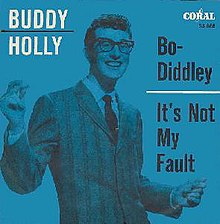
Ellas Otha Bates, known professionally as Bo Diddley, was an American guitarist and singer who played a key role in the transition from the blues to rock and roll. He influenced many artists, including Buddy Holly, Elvis Presley, the Beatles, the Rolling Stones, the Animals, George Thorogood, Syd Barrett, and the Clash.

"Love Is Strange" is a crossover hit by American rhythm and blues duet Mickey & Sylvia, which was released in late November 1956 by the Groove record label.

Checker Records is an inactive record label that was started in 1952 as a subsidiary of Chess Records in Chicago, Illinois. The label was founded by the Chess brothers, Leonard and Phil, who ran the label until they sold it to General Recorded Tape (GRT) in 1969, shortly before Leonard's death.

"Not Fade Away" is a song credited to Buddy Holly and Norman Petty and first recorded by Holly and his band, the Crickets.

"Mannish Boy" is a blues standard written by Muddy Waters, Mel London, and Bo Diddley. First recorded in 1955 by Waters, it serves as an "answer song" to Bo Diddley's "I'm a Man", which was in turn inspired by Waters' and Willie Dixon's "Hoochie Coochie Man". "Mannish Boy" features a repeating stop-time figure on one chord throughout the song.
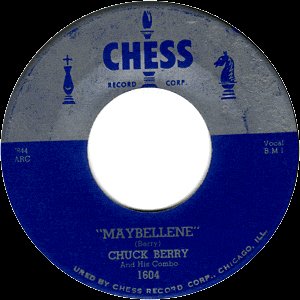
"Maybellene" is a rock and roll song by American artist Chuck Berry, adapted in part from the Western swing fiddle tune "Ida Red". Released in 1955, Berry’s song tells the story of a hot rod race and a broken romance, the lyrics describing a man driving a V8 Ford and chasing his unfaithful girlfriend in her Cadillac Coupe DeVille. It was released in July 1955 as a single by Chess Records, of Chicago, Illinois. Berry's first hit, "Maybellene" is considered a pioneering rock and roll song. Rolling Stone magazine wrote of it, "Rock & roll guitar starts here." The record was an early instance of the complete rock and roll package: youthful subject matter; a small, guitar-driven combo; clear diction; and an atmosphere of unrelenting excitement.
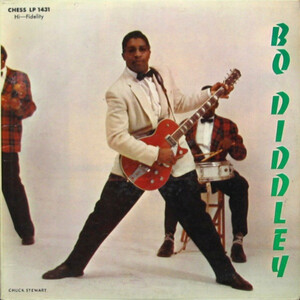
Bo Diddley is the debut album by American rock and roll musician Bo Diddley. It collects several of his most influential and enduring songs, which were released as singles between 1955 and 1958. Chess Records issued the album in 1958. In 2012, it was ranked number 216 on Rolling Stone's 500 Greatest Albums of All Time list alongside his second album, Go Bo Diddley (1959). The ranking of the album pair dropped to number 455 in the 2020 update of the list.

"I Wish You Would" is a song recorded by Chicago blues musician Billy Boy Arnold in 1955. It was developed while Arnold was performing with Bo Diddley and incorporates a Diddley-style rhythm. Called "a timeless Chicago blues classic", "I Wish You Would" is Arnold's best-known song and has been recorded by several artists, including the Yardbirds, who recorded it for their debut single in 1964.
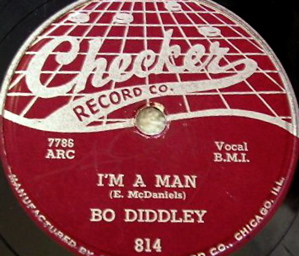
"I'm a Man" is a rhythm and blues song written and recorded by Bo Diddley in 1955. Inspired by an earlier blues song, it was one of his first hits. "I'm a Man" has been recorded by a variety of artists, including the Yardbirds, who adapted it in an upbeat rock style.
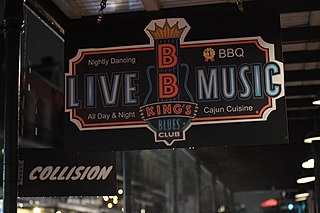
New Orleans blues is a subgenre of blues that developed in and around the city of New Orleans, influenced by jazz and Caribbean music. It is dominated by piano and saxophone, but also produced guitar bluesmen.

Go Bo Diddley is the second album by American rock and roll musician Bo Diddley, released in July 1959. The album was Bo's first studio album that included some material that hadn't been prereleased on singles, and his first LP for Checker Records. In 2003, Rolling Stone ranked it number 214 on its The 500 Greatest Albums of All Time, and 216 in a 2012 revised list.

"Who Do You Love?" is a song written by American rock and roll pioneer Bo Diddley. Recorded in 1956, it is one of his most popular and enduring works. The song represents one of Bo Diddley's strongest lyrical efforts and uses a combination of hoodoo-type imagery and boasting. It is an upbeat rocker, but the original did not use the signature Bo Diddley beat rhythm.
"Road Runner" is a 12-bar blues song performed by American rock and roll performer Bo Diddley, originally released as a single by Checker Records in January 1960, and later released on the LP record Bo Diddley in the Spotlight. The song reached #20 on Billboard magazine's Hot R&B Sides chart, and #75 on the Hot 100. The song has since been recorded by many artists.

Have Guitar Will Travel is the third studio album by rock and roll musician Bo Diddley. It was released on the Checker Records label in 1960.
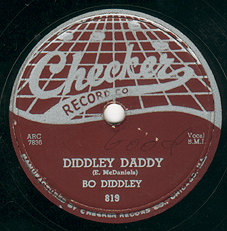
"Diddley Daddy" is a song by Bo Diddley. The song was issued as a single on Checker Records in June 1955. His second single, it followed on the heels of the success of the eponymous "Bo Diddley." The song spent four weeks on the Billboard R&B chart in the summer of 1955, peaking at No. 11.

Bo Diddley Is a Gunslinger is the fifth studio album by American rock and roll pioneer Bo Diddley released in December 1960 by Checker Records. The album title comes from the album's first track called "Gunslinger" and the cover art has Bo Diddley dressed in Western-style clothing. The songs for Bo Diddley is a Gunslinger were recorded from October 1959 to February 1960. Several tracks of interest are "Sixteen Tons" which Bo was supposed to perform on The Ed Sullivan Show, the title track, and "Diddling".

"Pretty Thing" is a 1955 song written by Bo Diddley and Willie Dixon and performed by Bo Diddley. The song was Diddley's third single release through Checker Records after "Diddley Daddy". In 1963, the song was released in the United Kingdom where it became Diddley's first of only two songs appearing on the UK Singles Chart, the other single being "Hey Good Lookin'".

"You Don't Love Me" is a rhythm and blues-influenced blues song recorded by American musician Willie Cobbs in 1960. Adapted from Bo Diddley's 1955 song "She's Fine She's Mine", it is Cobbs' best-known song and features a guitar figure and melody that has appealed to musicians in several genres.

"You Can't Judge a Book by the Cover" is a 1962 song by rock and roll pioneer Bo Diddley. Written by Willie Dixon, the song was one of Diddley's last record chart hits. Unlike many of his well-known songs, "You Can't Judge a Book by the Cover" does not rely on the Bo Diddley beat. A variety of rock and other performers have recorded renditions of the song.

Bo Diddley is the eighth studio album by American rock and roll pioneer Bo Diddley, not to be confused with the 1958 album of the same name. The 1962 album was released as Checker LP-2984 in August 1962 and featured the Willie Dixon-penned classic "You Can't Judge a Book by the Cover", which was released as a 7" 45 rpm single in July 1962.

